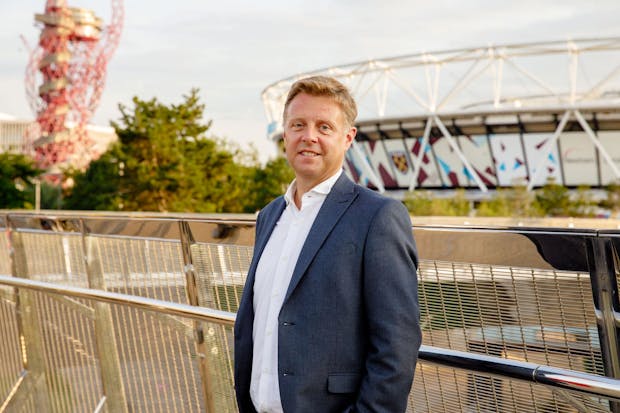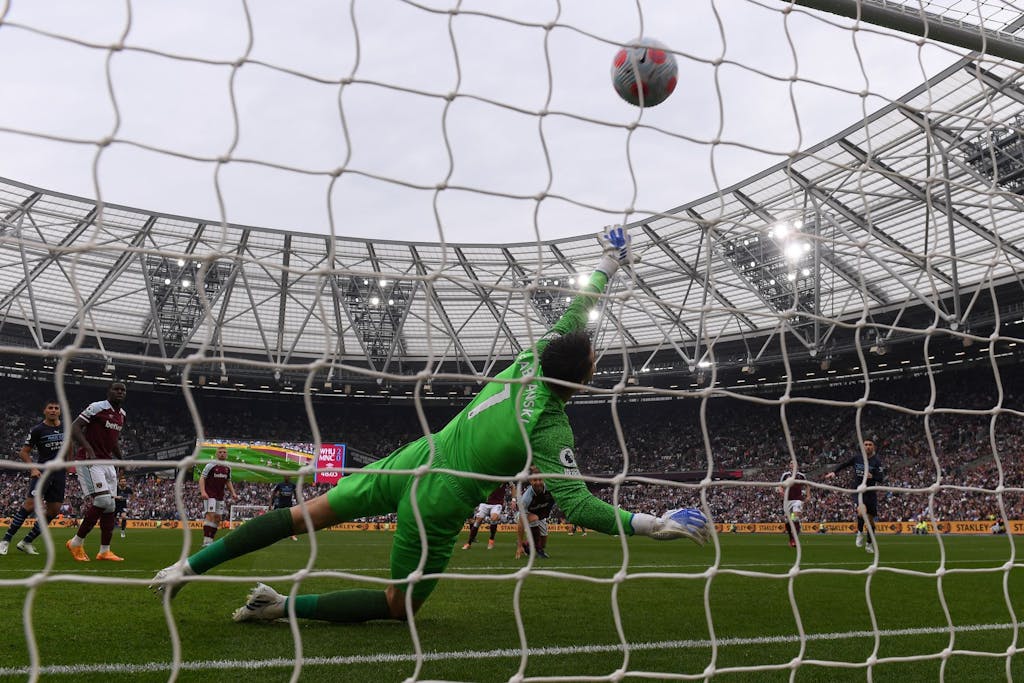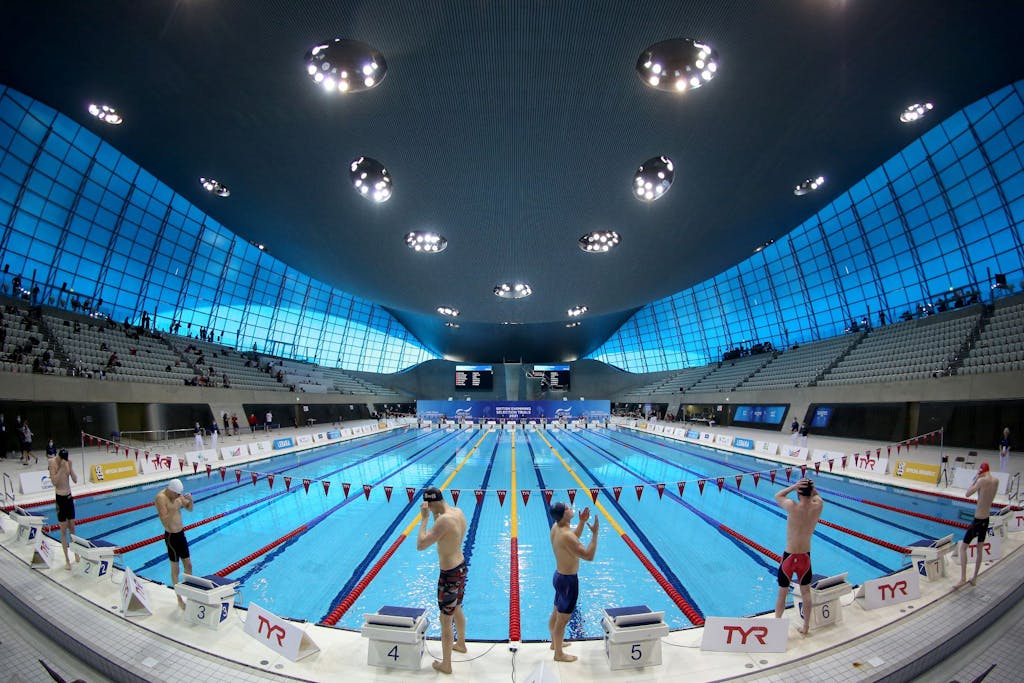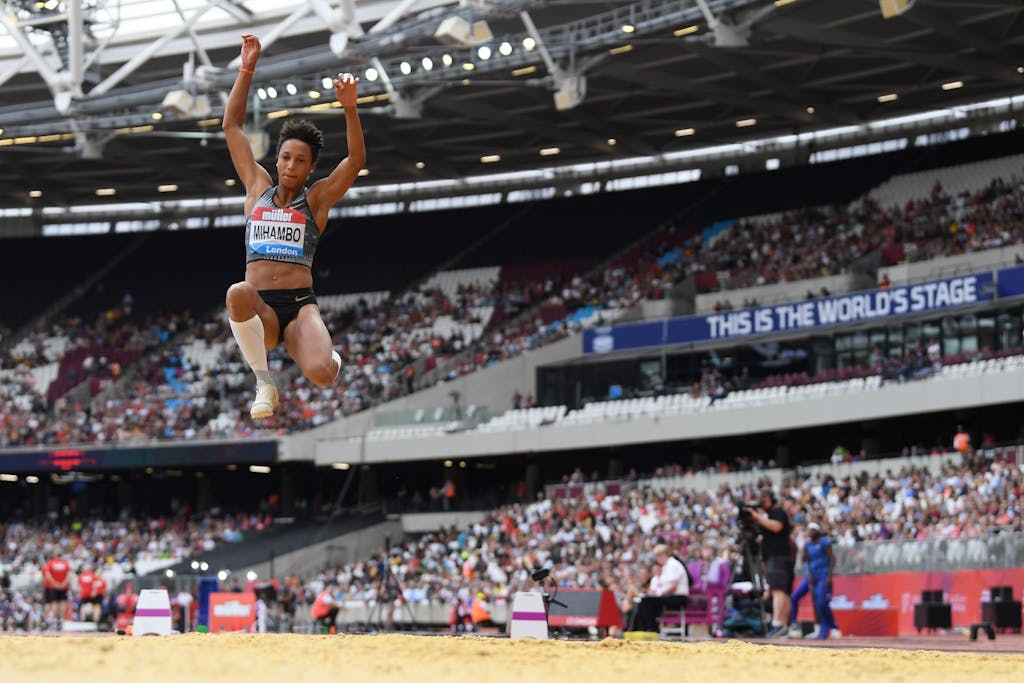
- Naming rights search hampered by lack of commercial expertise
- LLDC shifting to more purpose-driven sponsorship approach
- Operational contract for the Aquatics Centre and Copper Box will expire in 2023
The London Legacy Development Corporation, the commercial rights-owner for London’s Queen Elizabeth Olympic Park, is looking to reboot its sponsorship offering as the search continues for a naming rights sponsor for the London Stadium, the main venue for the London 2012 Olympics and current home of Premier League side West Ham United.
The appointment in 2020 of Nathan Homer as chief commercial officer has prompted a shift in the way the LLDC packages its rights. Before taking the role, Homer served as a sports marketing director for the Barclays banking group and consumer goods brand Proctor & Gamble and was the chief commercial and marketing officer for golf’s European Tour between 2016 and 2019. In March, the LLDC also enlisted the help of the CSM Sport & Entertainment agency to help shape a new commercial proposition for the park.
Reporting to the Greater London Authority (GLA), headed by London Mayor Sadiq Khan, the LLDC is responsible for delivering the legacy promises made in the London 2012 Olympic bid, as well as long-term planning, development, management and maintenance of the park. Homer’s remit consists of increasing income from the 564-acre estate and reducing costs to make the currently loss-making site financially sustainable.
Speaking to SportBusiness as the tenth anniversary of London’s hosting of the Olympics approaches, Homer said the LLDC is now seeking to bring a broader array of assets into its sponsorship offering to create a more brand-friendly proposition.
“There are naming rights for the stadium and some of the other venues, there are tickets, there’s hospitality, there’s databases, there’s content, a lot of the classic stuff, but there’s so much other activity that goes on at the park that chimes well with what you hear a lot of businesses and brands say really matters to them,” he said.
The LLDC will seek to leverage the park’s status as a community hub, business centre and cultural district, alongside its position as a sports event host, to deliver more bespoke, purpose-driven sponsorship packages for brands.
Tenants within the park include humanitarian agency Unicef and broadcaster BT Sport, which bases its studio in the former Olympic International Broadcast Centre. The site is also home to a range of educational establishments, including Loughborough University London, UCL, and Staffordshire University. Last year, the park also announced plans to become an esports hub and will soon be home to a new cultural district featuring BBC Music, a Sadler’s Wells dance studio and a new branch of the Victoria and Albert Museum.
Homer said: “There are so many aspects and narratives within the park story that we can put into a proposition for people alongside some of the things that still matter, like the ability to attract eyeballs and to have tangible assets such as tickets and hospitality.”
He added: “I think we’re pretty unusual here. We’ve got millions of people we can connect to from the classic B2C lens, we’ve got an almost unparalleled ability to connect people into institutional audiences and stakeholders, and we’ve got the ever-growing B2B network that we can place people into.”

London Stadium
A successful conclusion to the well-publicised and long-running quest for a naming rights sponsor for the park’s biggest venue, the London Stadium, would help to offset some of the substantial unbudgeted costs of converting the seating in the venue for use by long-term tenant, West Ham United. Cost escalations arose out of the need to extend the roof to meet Uefa requirements for all seats to be covered and the need for pitchside seats to be retractable so the venue could continue to host athletic events like the 2017 World Athletics Championships.
An independent review published by accounting firm Moore Global in 2017 revealed a total cost of £323m ($408.8m) to convert the stadium, exceeding the estimated transformation budget by £133m. The same analysis predicted a cumulative forecast deficit in excess of £140m for the venue over the next 10 years.
Under the controversial 99-year concession agreement signed with the London club in March 2013, West Ham agreed to make an upfront payment of £15m to the LLDC from the sale of its former Boleyn Ground and a further £2.5m per annum to rent the stadium over the life of the contract. Performance-related payments could see the rental income increase by up to £0.76m per year, while relegation to a lower division would see the sum drop to £1.25m per year.
The LLDC’s displeasure with the financial terms of the agreement was revealed when it launched a £12m claim against its former law firm Allen & Overy alleging it was negligent in the drafting of the contract. Homer declined to comment on the ongoing legal case.
Naming rights
The 2017 Moore Group review into the stadium contract revealed the LLDC is entitled to keep the first £4m of any naming rights sponsorship deal for the stadium, sharing anything above this figure 50:50 with the Premier League side. West Ham’s share is capped at their annual stadium usage fee, unless any increase in the value of the sponsorship deal is clearly attributable to club’s on-field performance (bonus payments for European football, for example).
Homer said: “The stadium naming rights sit with us. So, if you put your name on stadium, it’s the name on the stadium including [any event] that goes on there, including the Premier League.”
To date, the LLDC has endured a number of setbacks in its search for a sponsor. In 2017, Vodafone abandoned plans for a six-year deal reportedly worth £20m. This came the year after talks with Indian conglomerate Mahindra also collapsed over differences in the value of the rights.
Homer admitted that the LLDC’s search may have suffered in the past for a lack of commercial expertise at the legacy delivery body, as well as the decision to sell the naming rights as an “isolated” package of rights.
“I think the organisation would look at itself in the mirror and say that it has not necessarily had the right commercial capability to engage in those conversations. And I think most of the previous [conversations] were led by agencies,” he said.
“The assets within the naming rights are extremely valuable, but they don’t complete the picture most sponsors want today – [the package hasn’t included] things like first-party data, things like content and content creation, there weren’t other elements of activation programmes. Some of the things, I’d argue, that matter more to sponsors now weren’t there sitting alongside media value and other core assets.”

Park-wide sponsorship
Under the revamped commercial approach, Homer said the LLDC will seek to develop park-wide sponsorship packages that could also encompass the naming rights to the Olympic Velodrome, Aquatics Centre and Lee Valley Ice Centre. Depending on the needs of the sponsor, these traditional sports sponsorship rights could be packaged with more purpose-driven sponsorship assets supporting community or cultural events in the estate.
“We do jobs and skills and community integration and development with tens, or even hundreds, of groups through programmes that have been running for several years that have hard outcomes, hard data, real stories – all the sort of things sponsors want to get involved with,” said Homer.
“Purpose is probably an overused word by brands and business at the moment, but we say if you want to become part of something with a purpose, we are a brilliant example of it because everything we do is about regenerating communities within the broad setting of East London and beyond.”
Operational contract
Outside of sponsorship, the LLDC also generates income through multi-year leasing agreements covering different parts of the Olympic estate. The former Olympic broadcast centre is leased to a company called Innovation City (London) Limited, trading as Here East on a 200-year contract, while the Olympic Stadium is leased by a company called E20 Stadium LLP until 2115.
The Legacy Corporation retains the freehold of the London Aquatics Centre and the Copper Box Arena – home to handball, modern pentathlon and fencing during the 2012 Games – and engages Greenwich Leisure Limited (GLL) as the operator of both venues. Under the 10-year arrangement, which expires in March 2024, GLL meets the majority of operating costs and receives the income from hosting events in the venues. Surpluses and deficits are shared between the Legacy Corporation and GLL and the Legacy Corporation is responsible for the maintenance of the venues.
Homer said the LLDC might seek to change the operating model when the contract for the two arenas comes up for renewal. Although the planning consents for most of the park venues stipulate that they must continue to host the sports for which they were developed, he said there is still scope for them to show other events outside of these.
“It’s not that we’re going to lose the sporting legacy of any of the venues, but there might be a different mix than maybe has been used in the past. That might be true in some places, although clearly the Aquatics Centre is going to stay an Aquatics Centre – it’s harder to change the mix there.
“But somewhere like the Copper Box might offer an opportunity to create somewhere with a broader mix that means there’s more going on, which benefits the communities that use it, that may offer an alternative financial model that we can benefit from alongside the new operator.”

A future for athletics?
The LLDC chief maintained that the London Stadium will continue to host athletics events, despite a recent report in The Telegraph claiming it had held preliminary discussions with UK Athletics proposing to turn the venue into a full-time football ground.
The report claimed the LLDC was prepared to pay UKA between £10m-£15m to walk away from a contract granting it the right to host events like the Anniversary Games at the stadium each summer – an agreement made during London’s bid to host the Olympics. Such an arrangement would save the £3m spent every time the venue is converted to stage athletics and would free the way for West Ham to buy the loss-making venue outright.
Homer said a new deal to host Major League Baseball’s International Series until 2026, agreed just days after the publication of the story, contradicted the idea it was planning a football-specific venue.
“We’ve got events coming this year, that are aimed to be longer-term events. And we’ve got concert bookings already underway for next year. And actually, on athletics specifically, our contact with the UK Athletics team in the last month has actually been identifying the best weekend next year [for the UK federation’s hosting of the Diamond League] for them and for us, and we’ve got that. So, from our point of view, we’ve got the right date that works for them and works for us already diarised for next year.”
Loss-making
In spite of the growing calendar of events, Homer conceded that the London Stadium will “probably remain a cost to the taxpayer” for the “foreseeable future”. For that reason, the LLDC has been trying to reduce the running costs for the venue in parallel to its sponsorship and event hosting discussions.
He said the installation of LED lighting within the stadium has helped to reduce electricity consumption by a third, while the LLDC has also invested money to develop a more cost-effective way of changing the seating in the stadium. Beyond this, the legacy body is examining whether the park-wide installation of solar panels would help to further reduce costs and generate additional income.
“There’s a shift between looking at, again, the stadium alone versus the park in totality, including the stadium. How do we drive revenue in and costs across the total mix to improve the situation?”
Legacy
Asked if London 2012 has delivered on its legacy promises, Homer pointed to the way the International Olympic Committee references the city as an example of best practice. Legacy Stories, a video on the IOC website, claims the event delivered long-term benefits in areas spanning health, social inclusion, education, jobs, housing and community engagement. Future Olympic hosts are also known to visit the city to learn from its legacy delivery model.
Homer said: “Major urban regeneration costs an awful lot of money and whether you do it around an Olympics, or you just do it [alone], it costs you an awful lot of money. If we’d have lost the bid, the regeneration would have still needed to be done in East London and that would have cost a lot of investment from the government and the GLA.”
Referencing an economic investment report that calculated that the park’s hosting of MLB games was worth £50m in inward investment to the city, Homer argued that the park’s legacy should be evaluated in broader terms than its own profit and loss column. Moreover, he said the park was only 10 years of the way through a 30-year masterplan that would see additional housing, office space and private investment coming into the area in the next 10 years.
“It will be fascinating to jump forward 10 years – I can imagine what the Olympic Park will be like, and if people think it’s a pretty cool place today, in another five to 10 years it will be an astonishingly vibrant mix of all the best things people love.”